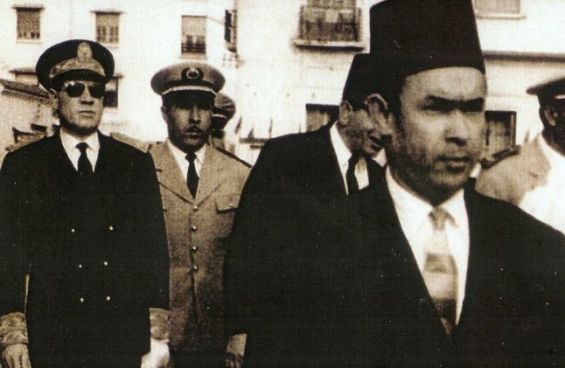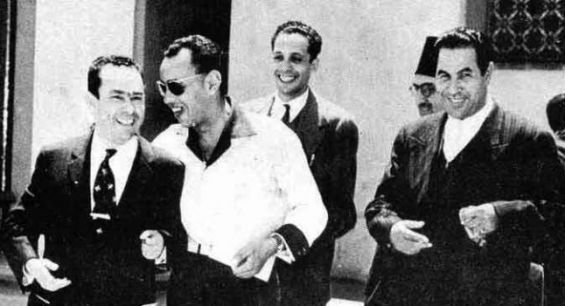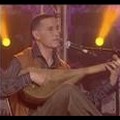On October 2017, the death of Mehdi Ben Barka, a Moroccan politician and leading founder of the National Union of Popular Forces (UNFP), was commemorated in France. 52 years after his controversial abduction, the investigation initiated to determine the circumstances of Ben Barka’s disappearance is still open. Kidnapped in Paris on October the 29th, 1965, the Ben Barka affair was investigated by the French magazine which published a story with the testimony of George Figon.
Figon, in his version of the story, claimed that he participated to the kidnapping of Ben Barka, creating a wave of criticism among the French public opinion for several weeks. With the photo of the head of the left-wing party in Morocco on its cover, accompanied with a red and attractive headline, the story conducted by Jacques Derogy and Jean-Francois Kahn has pushed Charles de Gaulle, recently re-elected president of France, to consider the affair «hateful”, calling during a press conference in February 1966 to question the progress of the investigation.
Two investigations
On the 26th of October 1965, Mehdi Ben Barka was in Geneva. He contacted Philippe Bernier, a journalist who was working on a documentary about decolonization. Their appointment was scheduled for Friday, 29th of October, at 12:15 at Brasserie Lipp, located at Boulevard Saint-Germain in Paris. On the day of his abduction, Ben Barka, who was accompanied by Thami Azemourri, a young Moroccan historian, was arrested by two police officers who were riding a Peugeot 403 car, and was never seen again.

On the 2nd of November, an investigation was opened by Judge Louis Zollinger and entrusted to the Brigade criminelle, the oldest and perhaps most famous, in charge of homicides, kidnapping, bomb attacks and investigations involving personalities, which was headed by Commissioner Bouvier. Meanwhile, Jacques Derogy and Jean-Francois Kahn were focused on their own investigation. That day, they met Philippe Bernier with Ben Barka’s brother. «They informed us that two of Ben Barka’s sworn enemies were miraculously present in Paris : Mohamed Oufkir, the Moroccan Interior Minister and Ahmed Dlimi, head of the Moroccan security services. Bernier was particularly worried about the role George Figon played in the affair as he disappeared since the meeting in the Brasserie Lipp», wrote Jacques Derogy in an article published in 1995.
The three journalists’ meeting had led them to another unrevealed part of the story : a tête-à-tête with Pierre Lemarchaud, George Figon’s lawyer. An article entitled «The strange coincidences in the Ben Barka’s affair» was published following this meeting without attracting too much attention. The story focused on the searches carried out in the villa and in the house where Ben Barka was held.
The first article
Around mid-December, Georges Figon, having been the subject of an arrest warrant, contacted the two journalists. His first revelations were featured in a second article published on December the 20th, «without affecting the reelection of General de Gaulle». This article reports Figon’s version of the story regarding the arrival of Dlimi and General Oufkir, then Minister of Interior in the villa where Ben Barka was kidnapped.

«In the evening, he (Mehdi Ben Barka) went to bed and we seized the opportunity to call Dlimi, head of the security services, and Oufkir, the Interior Minister. We briefly spoke as everyone of us knew perfectly what it was. Moroccans are skeptical; we’ve already done it before to get money. Ironically, Dlimi asked 'what do you mean by saying once again ?', then Dubail took the phone :
- We want to say that the parcel is here!
- What, the parcel?
- Yes, the package.
- Packed up ?
- Yes, packed up.
- That's good, we're coming».
The testimony of George Figon, published by L’Express on January the 10, 1966.
It was on January the 10th that a «fifteen pages documentary», containing George Figon’s testimony was published on L’Express. «Our scoop is a big twisted story», said Jacques Derogy. New revelations were added to the investigation led by Judge Louis Zollinger, in addition to a denial issued by George Figon in which he denies his previous statement. On the 17th of January, 1966, Figon was shot dead in his Paris apartment on Rue des Renaudes. Media at the time pointed out at the weird way in which the man committed suicide including international magazines such as the Times and the Daily Mail.

On the same day, several prestigious personalities from political, cultural and scientific circles called for «shedding light on Mehdi Ben Barka’s disappearance». They demanded that «the names of the ones responsible for what happened should be revealed».
«That's when Dlimi and Achachi got to the first floor. As soon as he saw Dlimi, Ben Barka was terrified, and stopped debating. We started by tying him using ropes that Palisse purchased. It is Dubail who tied down his feet. (...) At that moment, on the ground floor, comes Oufkir, wearing a big black felt hat.»
The testimony of George Figon, published by L'Express on January 10, 1966.
De Gaulle finally recognizes that the French were involved
On January the 22nd, Judge Zollinger issued three international arrest warrants against General Oufkir, Commander Dlimi and Larbi Chtouki who also took part in the kidnapping of Ben Barka. Two days later, L’Express published an 18 pages article devoted to the affair and divided it into five weekly series.
On the 21st of February, General de Gaulle finally commented on the Ben Barka affair in a press conference. It is only on September the 5th that the trial of the accuseds was opened in Paris to end on June 5th, 1967.

Antoine Lopez, Moroccan intelligence informant (SDCE), and Louis Souchon, one of the police officers who arrested Ben Barka, were sentenced to imprisonment. Others were acquitted while General Mohammed Oufkir, Ahmed Dlimi and five other French nationals on the run, were sentenced in absentia to life imprisonment.
Several versions of the story made it to the surface later on, suggesting that the Israeli Mossad was involved in getting rid of Ben Barka’s body. No one knows till now the details of what exactly happened to Hassan II’s biggest opponent.





 chargement...
chargement...













